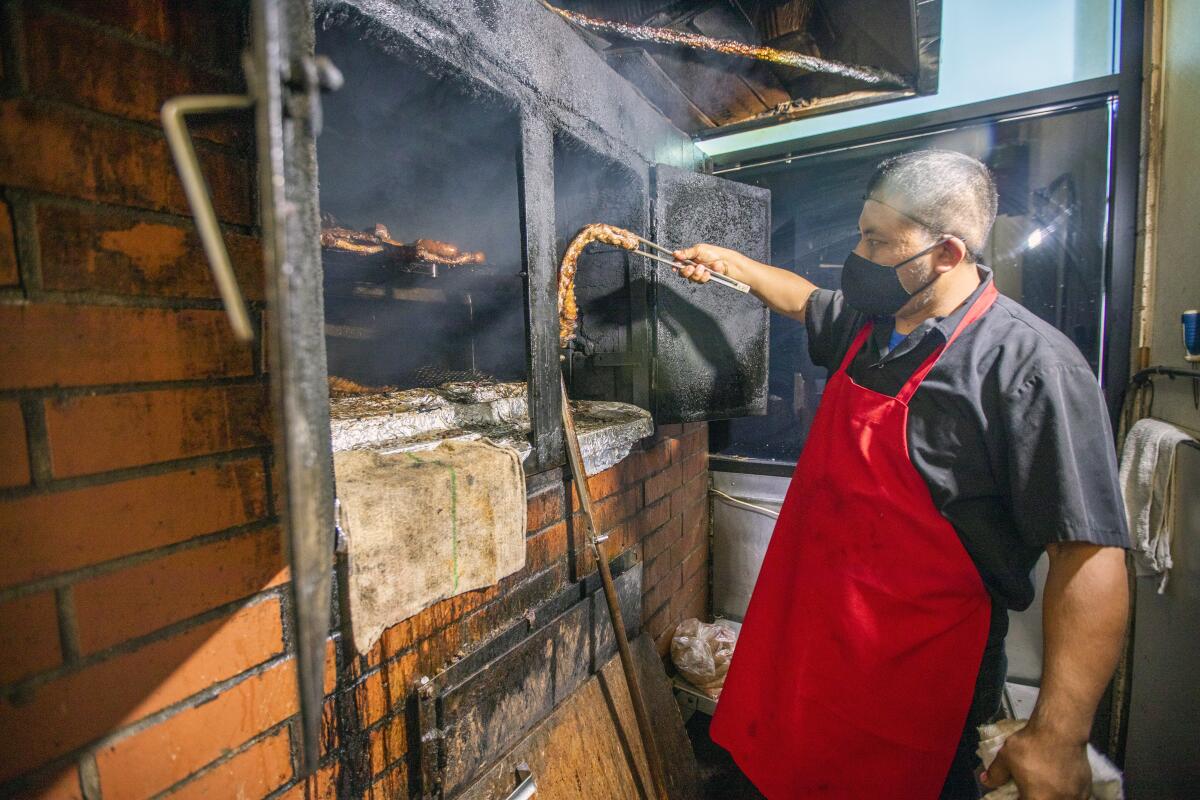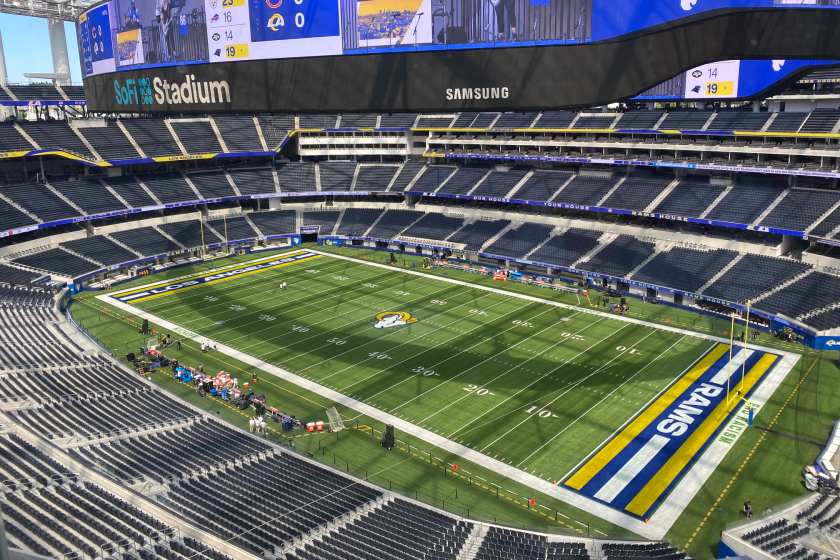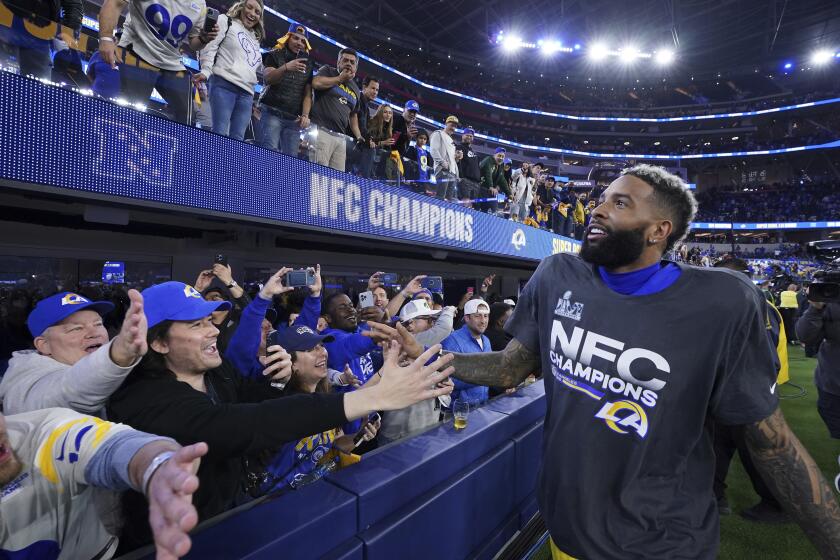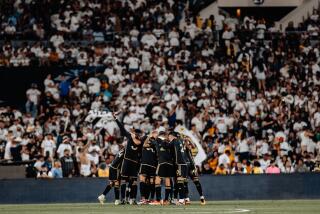L.A. gives the Super Bowl, 2028 Olympics high marks but questions economic benefits

Sunday’s Super Bowl and the 2028 Olympics enjoy broad support among residents of the Los Angeles region, despite skepticism about claims that the events will bring significant economic benefits to local communities, a new Los Angeles Times/SurveyMonkey poll has found.
By hosting these two mega-events in relatively rapid succession — shortly after the opening of SoFi Stadium, one of the world’s most expensive venues — greater L.A. has positioned itself as America’s premier sports destination. The region is also slated to host the college football national championship game next January and is in play to host the World Cup in 2026.
But the process leading up to these spectacles, much like the construction of the arenas that will host them, is naturally divisive. Some Angelenos and experts take issue with tax breaks and other perks for developers. Others worry that the benefits of extravagant sports palaces and contests will not be shared by locals.
The new poll reveals strong support in the region both for bringing high-profile events to L.A. and for the venues where they will take place. It provides one of the first tests of public reaction to plans for the city to host the 2028 Olympics.
The survey, conducted Feb. 1-7, found that 63% of residents in the greater Los Angeles region — Los Angeles, Orange and Ventura counties and the Inland Empire sections of Riverside and San Bernardino counties — are looking forward to having Los Angeles host the Super Bowl on Sunday.
What do Americans think about the nation’s biggest annual sports event? Here’s how we found out.
The Olympics garnered even greater support, with 76% of residents saying they favor the city hosting the Games, compared with 16% who were opposed.
Support for hosting big sporting events is higher among residents of color than among white residents, the poll found.
The survey found that 51% of white Angelenos and 71% of people of color are looking forward to the city hosting the Super Bowl this weekend. Support for L.A. hosting the Olympics stood at 79% among residents of color, compared with 71% among white residents.
Los Angeles resident Stef Michaels is a travel writer and blogger who has visited athletic venues all over the globe. She said Tuesday that we are witnessing the city’s “ascendance” as a sports mecca.
“Now not only do we have two football teams, but we have this world stage with so many events coming here and people coming here,” Michaels said. “This is a great opportunity for Los Angeles to present itself to the world.”
The widespread support shown in The Times survey is in keeping with past polling in other Super Bowl and Olympics host cities, according to Dennis Coates, a professor at the University of Maryland, Baltimore County, who has studied sports economics.
“People like to be the host and put on a good event,” he said in an email. “Hosts of successful parties are glad to have hosted the parties, often discounting or ignoring the actual cost of throwing the party in the first place.”
But despite the support, the region’s residents are less convinced that the events will be beneficial to the city and its residents, according to the poll and interviews with people who call the most-affected areas home.
Shemika Williams, 37, lives across the street from SoFi Stadium. Although she is excited by the prospect of the Super Bowl arriving in Inglewood, she said the congestion over the last two weeks has been difficult to handle.
“It’s just busy and crowded and everything is compact,” Williams said. “There’s no parking, there’s noise all day, half of the streets are closed. It’s cluttered; it’s a mess.”
Super Bowl preparations have soured some of the civic pride Williams said she had in her city.
“I guess it’s something I’ll have to deal with because this is big, and it’s bragging rights for L.A., for Inglewood,” she said. “It’s something to be proud of that everyone is coming here.”
The Rams really might be able to use their Super Bowl run to win over more Southern California fans, according to an L.A. Times/SurveyMonkey poll.
Only 7% of respondents in the greater L.A. region said they thought the nine-figure SoFi Stadium has had a negative impact on Inglewood and surrounding communities, while 49% said they think it has had a mixed impact, and 36% described its impact as positive.
In recent weeks, news stories have emerged about unhoused people being cleared from areas surrounding the stadium, and food cart vendors and other proprietors being warned about selling their wares on Super Bowl Sunday.
Santa Fe Springs resident Josefina Canchola, 57, said she’s been awash in buzz for the NFL championship over the last two weeks. Her sister, a parole officer, has picked up a well-paying temporary side job with Super Bowl security. In the Canchola household, sports is life, and family members have been texting and talking about the game and the halftime show as the big day nears.
“This is a time to celebrate,” she said. “We’re not so much celebrating the teams but ourselves. This has been a difficult two years, and we can use something to get excited about.”
Andrew Zimbalist, an economics professor at Smith College in Massachusetts who has studied these issues for decades, warned the Super Bowl is unlikely to have a significant positive economic effect on most residents and businesses near SoFi Stadium.
“People will be coming from outside of town and eating at restaurants and shopping at businesses mostly outside of Inglewood,” he said. “The Super Bowl’s economic impact has been substantially overplayed.”
Like most experts who spoke with The Times, Allen Sanderson, a professor at the University of Chicago who specializes in sports economics, went a step further: He played down the local economic benefits of football stadiums themselves.
“In general, football stadiums don’t contribute very much to the local economy,” he said. “It’s not a catalyst for economic development because no one wants to be near it because it’s closed all the time. Also … people drive to the game, have a few beers, sober up and drive home, and they’re not spending a ton of money.”
Many Angelenos appear to share that skeptical view. The poll found that 35% of people in the metropolitan region said they believe local residents and businesses see the most benefit from large sporting events; 59% said those benefits inure more to large corporations and wealthy individuals.
While getting lunch at Woody’s Bar-B-Que in Inglewood on Wednesday, Bellflower resident Dollie Lee said she is not thrilled about the Super Bowl’s return to Los Angeles County. She pointed to the price of some of the cheapest tickets available to attend the game — between $4,000 and $5,000 as of Wednesday morning — as a symbol of what is wrong with society.
“Imagine investing $5,000 per student in arts or reading or after-school activities … I just want to see where the tax dollars and revenue from this go,” Lee said. “Bottom line is who does this help?”
Large numbers of Republicans have soured on the NFL and disapprove of the league’s efforts to improve treatment of Black players, poll shows.
The fact that the Olympics is more popular than the Super Bowl made sense to Victor Matheson, a professor at College of the Holy Cross in Massachusetts who researches sports economics.
“You have a lot of the excitement about the potential for the Olympics and none of the hassles yet of the construction projects or the actual congestion during the event itself,” he said. “So right now all of this looks great without any of the hassles of the actual event.”
Belief that the benefits of hosting the Super Bowl and Olympics will be felt most by local businesses and residents was also higher among people of color in the region who were surveyed, at 39% versus 29% of white residents. In contrast, 56% of residents of color said they believe large corporations and the wealthy would see the most benefit, compared with 64% of white residents.
While opinions on the Super Bowl, Olympics and stadiums vary widely among greater L.A. residents, one thing nearly all Angelenos share is angst over the high price of tickets.
“Many Angelenos won’t even get a chance to watch the games in person,” Michaels said.
More to Read
Sign up for Essential California
The most important California stories and recommendations in your inbox every morning.
You may occasionally receive promotional content from the Los Angeles Times.















